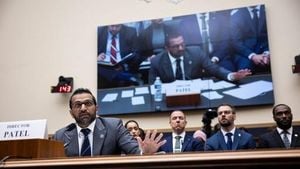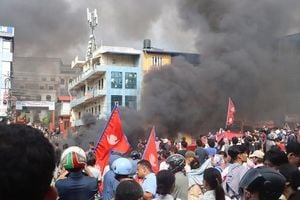Nippon Steel’s proposed acquisition of U.S. Steel has thrown the spotlight on the intersection of foreign investment and American labor interests, triggering significant political and economic debates across the country. With U.S. Steel being not just another corporation but one deeply woven with the fabric of American industrial history, its potential sale has raised eyebrows and garnered hot opinions from various stakeholders.
Following their acquisition announcement last December, which was valued at $14.9 billion, Nippon Steel has faced a torrent of opposition from both sides of the political aisle. Lawmakers expressed serious concerns about the deal's national security ramifications, considering U.S. Steel's central role not only economically but also strategically. On September 21, Japanese Prime Minister Fumio Kishida's meeting with President Joe Biden underscored the stamp of international relations as the two leaders spoke of the solid U.S.-Japan alliance shaped by shared economic interests and security concerns.
Despite the warm reception between Kishida and Biden, the Biden administration’s stance on the acquisition has been anything but friendly, fueled by pressure from domestic labor unions. The labor leadership's alarm over potential job losses has culminated in significant political backing against the deal. Even figures from both parties like Vice President Kamala Harris and former President Donald Trump have publicly voiced their opposition, echoing sentiments shared by the United Steelworkers union.
To combat the heated scrutiny, Nippon Steel ramped up its lobbying efforts significantly. During the summer months leading to the fall political season, the company shelled out $1.3 million—a staggering increase compared to its $1.1 million lobbying total for the previous seven months combined. This surge demonstrates the company's seriousness about overcoming the hurdles to securing the merger and is indicative of the pressures it faces from Washington.
The lobbying firm Akin Gump Strauss Hauer & Feld was recruited shortly after the acquisition announcement to tackle issues surrounding the merger. The lobbying firm has been engaging not only with members of Congress but also with key figures from the Executive Office, particularly targeting the Committee on Foreign Investment in the United States (CFIUS). This interagency committee is pivotal because it reviews significant foreign investments and their potential impacts on U.S. national security.
Interestingly, when Nippon Steel's vice chair made his plea to U.S. officials, there was hope for the company as CFIUS agreed to postpone judgment on Nippon’s bid until after the election, allowing the company to refile its request. This strategic delay raises the stakes, as the outcome could hinge on shifts within the political climate post-election.
The situation is particularly tenuous because many understand the stakes involved. U.S. Steel has indicated it may cut jobs and could relocate its headquarters from Pittsburgh if the deal collapses. Such drastic measures would not only perpetuate economic instability but also shake the roots of one of America’s traditional industrial heartlands.
On the ground, opinions among union workers appear divided. While some express outright disapproval of the deal due to the uncertainties it presents for labor conditions, others acknowledge the substantial investments Nippon Steel has pledged. This includes at least $1 billion directed toward upgrading U.S. Steel’s infrastructure at its Mon Valley Works facility, along with promises to respect existing union contracts—a point highlighted by local leaders like Pennsylvania Senate President Pro Tempore Kim Ward.
Ward stressed the importance of embracing Nippon's investment, noting it will modernize the manufacturing operations and lead to necessary job creation for local craft trades. This perspective also finds echoes among free-market proponents, arguing against the political maneuvering they see as shortsighted “cronyism.”
Publications like The Wall Street Journal and commentators like Eric Boehm from Reason have criticized the opposition to the deal as not just economically foolish but also politically naive. They argue Japan remains one of America's strongest allies, and halting foreign investments would counterintuitively hurt domestic production and employment.
Lowman S. Henry, chairman and CEO of the Lincoln Institute, has praised the potential merger, contending the growth it promises belies current fears. He urges policymakers to align their actions with economic realities rather than political sentiments, arguing for the success of the acquisition on its own merits. This call reflects the establishment’s desire for bipartisanship amid partisanship when it could lead to economic recovery and stability.
The acquisition saga continues to evolve, and with it, the discussions around the broader ramifications for U.S.-Japan trade relations and domestic manufacturing jobs. Whether the political tide will shift enough to celebrate the merger or retain the earlier opposition remains to be seen. What is clear, though, is the crossroads at which U.S. Steel finds itself—balancing its legacy with future potentials as the nation's economic and political landscapes shift rapidly.



